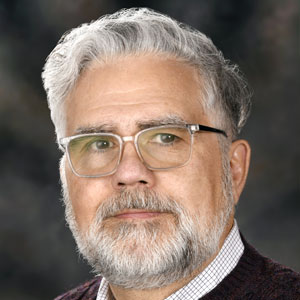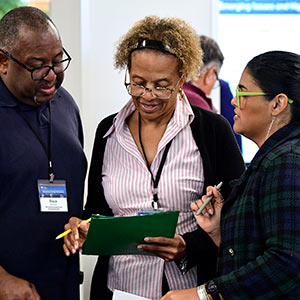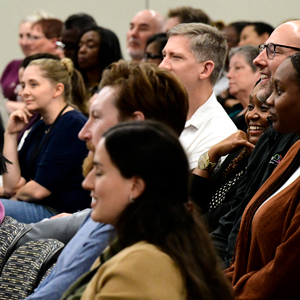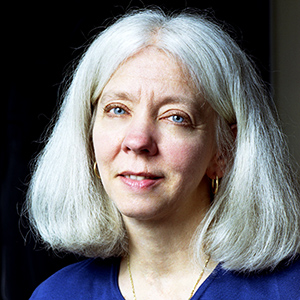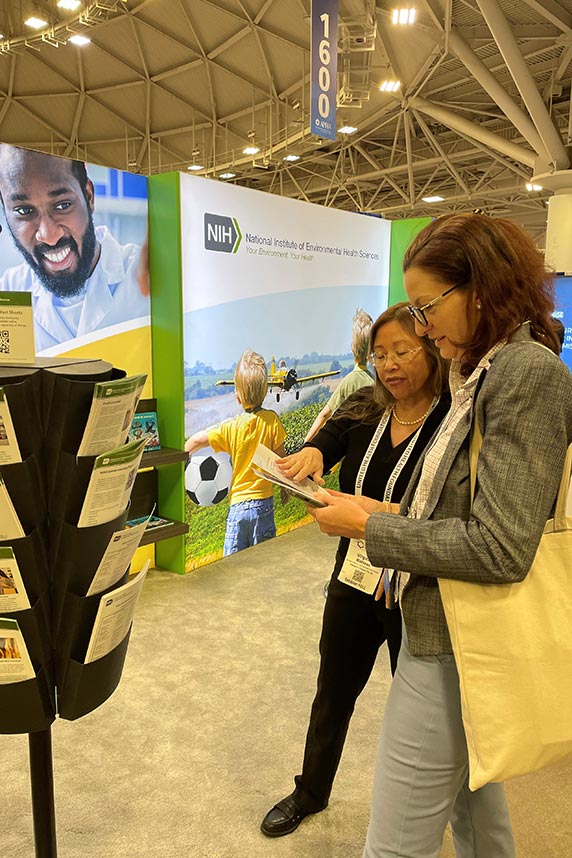
NIEHS staff, grant recipients participate in APHA annual meeting
The American Public Health Association (APHA) Annual Meeting and Expo held in Minneapolis Oct. 27-30 drew more than 12,000 public health leaders, including NIEHS staffers and grant recipients from around the country.
Staff engaged in NIEHS communications, scientific coordination, and community engagement presented at and attended the meeting, which focused on rebuilding trust in public health and science.
Read more about NIEHS-related conference presentations here. (EH)
Mary Díaz Santana, Ph.D., receives Revolutionary Spirit Award
Mary V. Díaz Santana, Ph.D., an epidemiologist in the NIEHS Biostatistics and Computational Biology Branch, was one of six awardees recognized for their achievements during the UMass Alumni Honors held Oct. 10 in Worcester, Massachusetts. Díaz Santana received the Revolutionary Spirit Award, which honors alumni or friends who embody the revolutionary spirit of University of Massachusetts Amherst as pioneers, builders, and unconventional doers committed to the relentless pursuit of innovation and progress.
At NIEHS, Díaz Santana leads a team working to improve risk assessment techniques for precision prevention, lessening the burden of cancer and chronic diseases, like diabetes, in racial and ethnic minority women.
Watch this video to learn more about her research and the other award recipients. (EH)
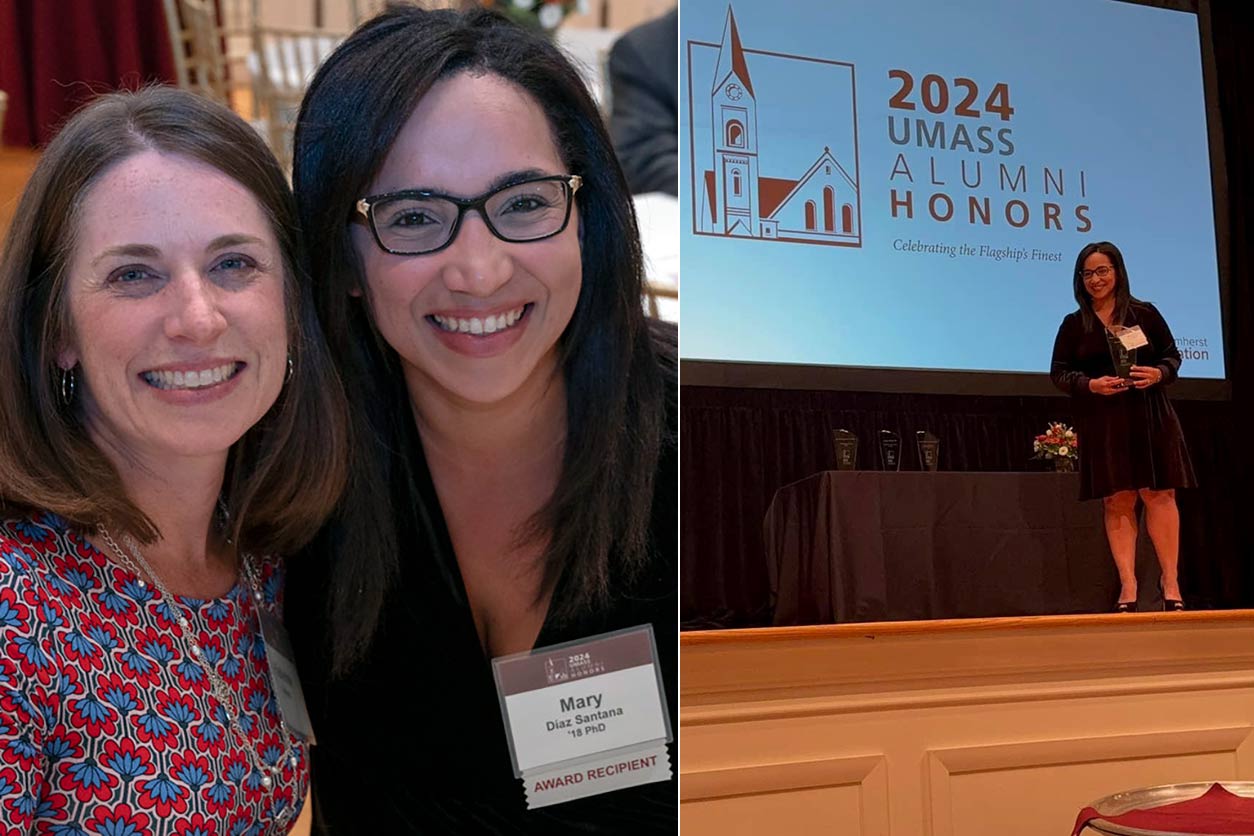
Developing nuanced approaches for risk assessment
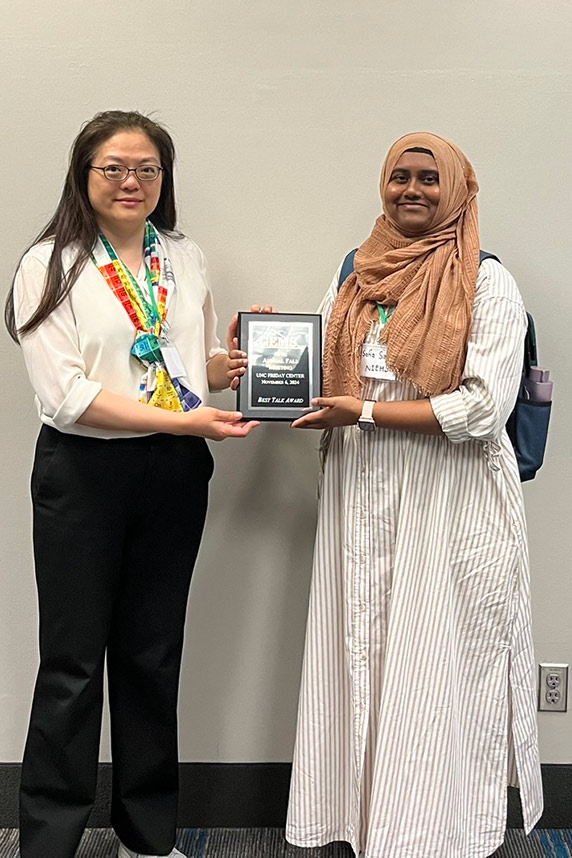
Expanding approaches to assess how chemicals can damage DNA was front and center at the fall meeting of the Genetics and Environmental Mutagenesis Society of North Carolina (GEMS). Amy Wang, Ph.D., of the NIEHS Division of Translational Toxicology (DTT) and president-elect of GEMS, welcomed almost 50 attendees to the Nov. 6 gathering at the University of North Carolina at Chapel Hill Friday Conference Center.
Four speakers responded to a core question, “Is it time to go beyond ‘yes’ or ‘no’ for genotoxicity?” The talks generated robust discussion about labeling the risks that substances pose to DNA simply as toxic or nontoxic. Evaluations frequently benefit from more nuanced analysis of genetics, dosages, types of exposure, and other factors, noted Scott Auerbach, Ph.D., of the DTT Predictive Toxicology Branch.
The symposium also incorporated oral presentations for trainees and a poster session for all. Best trainee oral presentation and best trainee poster received cash awards. “It is encouraging to see the enthusiasm from scientists of all career stages, and that the GEMS community is growing by reaching out to the earlier career scientists,” Wang said. (DM)
North Carolina Global Health Alliance Conference held in Raleigh
NIEHS co-sponsored the North Carolina Global Health Alliance’s 11th annual conference Oct. 22 at the McKimmon Center in Raleigh. The event provided an opportunity for the local global health community and public health professionals to network and hear about issues of emerging concerns, how to apply best practices, and more. North Carolina boasts a $32 billion global health industry addressing challenges from rural health access to crisis response to HIV programming to workforce development challenges that mirror global health problems. With a focus on cross pollination and bidirectional learning, the meeting highlighted the Local is Global doctrine.
Peter Kilmarx, M.D., deputy director of the National Institutes of Health (NIH) Fogarty International Center, gave the keynote address. Kilmarx serves on the Executive Committee of the NIH Climate Change and Health Initiative, and he has led analysis of NIH global health activities, built coalitions with high-level NIH and external stakeholders, and represented the center and NIH in national and international forums. (See this Director’s Corner for more.)
Attendees also enjoyed an exhibit hall, poster presentations, and sessions on topics such as the impact of misinformation on health and addressing global health priorities in North Carolina. (EH)
(Erica Hinton is a contract writer for the NIEHS Office of Communications and Public Liaison (OCPL), and Douglas Murphy, Ph.D., is a technical writer-editor for OCPL.)





